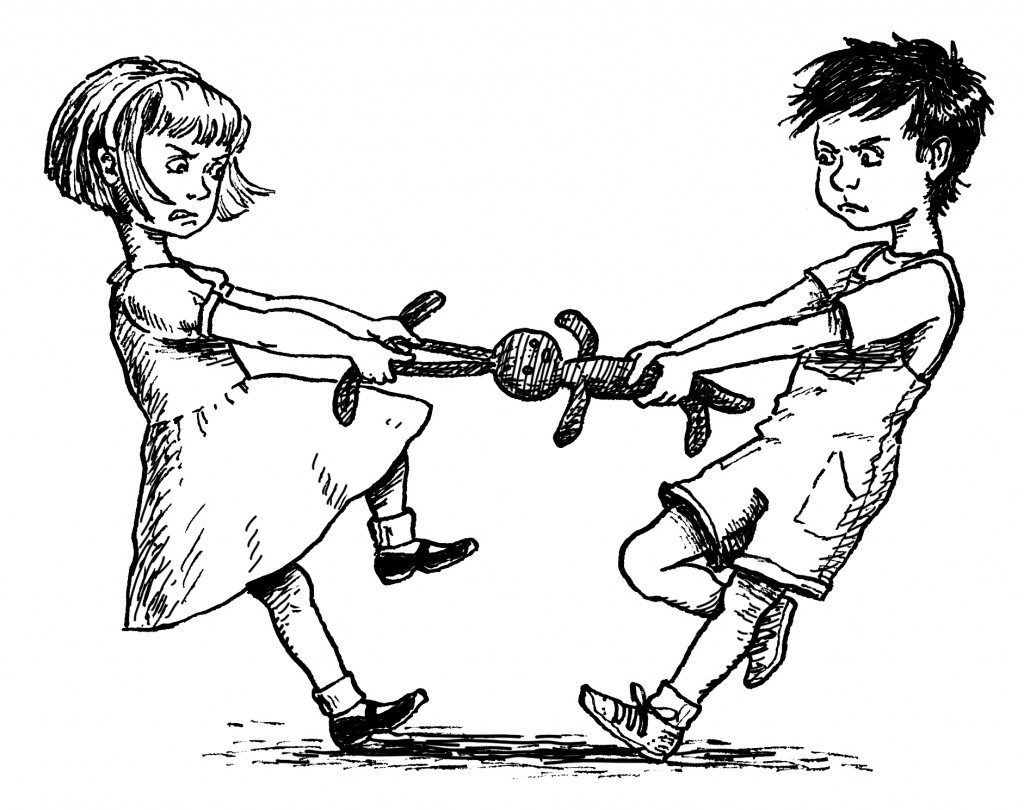Throw Away your Timer: Why Kids Learn More when they Don't "Share"
As soon as children are old enough to walk, we expect them to share. I prefer putting "share" in quotes, since this type of sharing is usually forced by the adult. Our goals are noble: kindness, generosity, awareness of others. Unfortunately, our approach backfires.
Kids learn more life skills --and develop better generosity--when they aren't forced to share.
Of course, sharing squabbles happen all the time between kids. Here’s a typical scene: One child is busily engaged with a toy when a new child comes up and wants it. A nearby adult says: “Be nice and share your toys,” or “Give Ella the pony. You’ve had it a long time.” What happens? The child is forced to give something up and her play gets interrupted. She learns that sharing feels bad. It’s the parent who’s sharing here, not the child.
Traditional sharing expects kids to give up something the instant someone else demands. Yet we don’t do this ourselves. Imagine being on your cell phone when somebody suddenly comes up and asks for your phone or takes it from you. “I need to make a phone call,” he says. Would you get mad? As adults, we expect people to wait their turn. We might gladly lend our phone to a friend or even a stranger, but we want them to wait until we’re done. The same should apply to kids: let the child keep a toy until she’s “all done.” It’s turn-taking. It’s sharing. But the key is it’s child-directed turn-taking.
Positive assertiveness
Here’s what it looks like in real life. Instead of YOU saying “Five more minutes, then it’s Ella’s turn” or "I'm going to set the timer," teach your child to say “You can have it when I’m done.” This teaches positive assertiveness. It helps kids stand up for themselves and learn to set boundaries on other kids. What a terrific life skill. How many of us as adults have trouble saying “no?”
True Generosity and Awareness of Others
When the first child drops the toy and moves on, remind her that Ella’s waiting for a turn (a great lesson in courtesy and awareness of others). The best part of all is when the first child willingly hands over the toy—it’s a joyous moment for both kids. That’s the moment when your child experiences the rush of good feelings that comes from being kind to others. It’s true generosity. It’s a warm feeling. One she’ll want to repeat over and over – whether a parent is watching or not.
Emotional Impulse Control
What about the waiting child? Waiting is hard, especially for impulsive 2-6 year olds, but just like assertiveness, waiting is an excellent life skill. It’s OK for the waiting child to feel frustrated, sad or angry for a time. Don’t be afraid of a few foot stompings or tears. Learning to control behavior and express intense feelings appropriately is really the main job of early childhood. Impulse control (waiting for a toy and not grabbing) is a vital part of brain development and gets stronger through practice. The more practice kids get, the better. Sharing through turn-taking provides excellent practice.
Life is much more relaxing when you stop playing referee. Throw away your timer. Kids pick up the new method quickly, because it's fair and simple. Let kids keep a toy until they are "all done."
Words you can say
Positive assertiveness
- You can play with it until you’re all done.
- Are you finished with your turn? Max says he’s not done yet.
- Did you like it when he grabbed your truck? Tell him to stop!
- Say: “I’m not done. You can have it when I’m done.”
- She can have a turn. When she’s all done, you can have a turn.
- I see Bella still has the pony. She’s still using it.
- You’ll have to wait. I can’t let you take it out of her hands.
Waiting and awareness of others
- Oh, it’s so hard to wait!
- You’re so mad. You really want to play with the pony right now!
- You can be mad, but I can’t let you take the toy.
- Will you tell Max when you’re all done?
- I see you’re not using the truck any more. Go find Ben. Remember, he’s waiting for a turn.
 Curious to learn more? See this sharing video and watch for future posts on taking loooong turns, hogging toys, waiting lists and making the transition to turn-taking.
Curious to learn more? See this sharing video and watch for future posts on taking loooong turns, hogging toys, waiting lists and making the transition to turn-taking.
Or check out a free sample chapter from the book It’s OK Not to Share…And Other Renegade Rules for Raising Competent and Compassionate Kids. Sharing and long turns are just two of the 29 “renegade rules.”
Did you ever resent sharing something as a child? Have you tried child-directed sharing?
